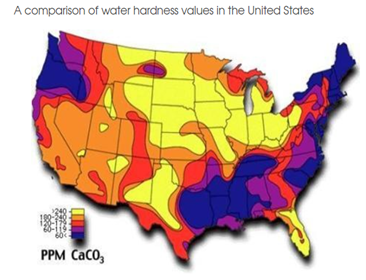Image of the month
Does water type matter?
Why add water?
Increasing dietary water from 7% to 73% decreased calcium oxalate relative supersaturation (a surrogate marker for stone formation) in normal dogs and cats (Stevenson 2003 & Buckley 2011).
Is hard water detrimental?

The answer may be surprising. Water hardness is determined by its quantity of calcium carbonate. Soft water is <60mg/L and very hard water is >180mg/dl. Tap water varies in mineral and electrolyte content between geographic areas even in the same country (Figure1). In human stone formers, hard water increased calcium excretion, but either resulted in no difference or a decrease in rates of stone formation (Sulaiman 2020). Other factors such as magnesium and bicarbonate content may be responsible for this paradoxical finding (i.e. higher urine calcium associated with lower calcium stone rates).
Clinical impact
Additional water intake has a beneficial effect in preventing calcium oxalate stones (add 1 cup of water to every cup of dry canine c/d multicare to achieve a moisture content of >73% or fed c/d multicare canned which is >77% moisture). Paradoxically, hard or tap water with higher calcium, magnesium and bicarbonate or other alkaline buffers may be preferable to distilled water or soft mineral water. Studies in dogs and cats with urolithiasis have not been performed.
References
- Stevenson, et. al. Res Vet Sci. 2003;74:145 (doi.org/10.1016/S0034-5288(02)00184-4)
- Buckley, et. al. Br J Nutr. 2011;106:S128 (doi.org/10.1017/S0007114511001875)
- Sulaiman, et. al. Curr Urol Rep 2020;21, 6 (doi.org/10.1007/s11934-020-0968-3)
- Figure 1: A comparison of water hardness values in the United States. https://www.citymb.info/departments/public-works/utilities-division/watersystems/treatment/hard-facts-about-hard-water Accessed 12/23/2020